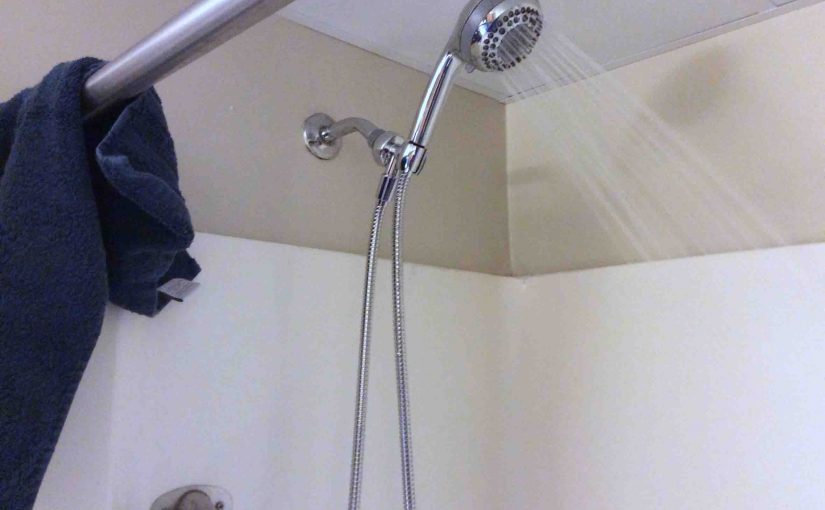We installed our new hand held massaging shower head, in less than fifteen minutes. In this piece we cover the instructions on how to install hand held shower head.
How to Install Hand Held Shower Head
We needed no tools or supplies, except for when removing the old shower head. For that, we used a Crescent adjustable wrench. Here’s how we did that.
Remove Old Fixed Mount Shower Head
Now to the hardest task in installing a new hand held massaging shower head. This is probably removing the old fixed mount shower head. Especially if it’s at least several years or decades old, or shows signs of metal corrosion.
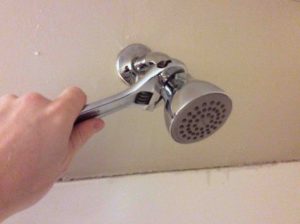
Clean Threads of Water Pipe
Note the debris hanging off the water pipe threads in the next picture. Good idea to clean off any old plumbers tape and putty sealants. This ensures washer seal integrity when you screw on the new shower head holder.
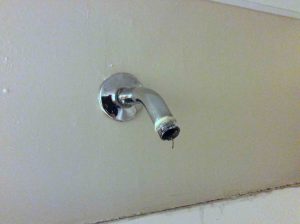
Peel Off Any Old Plumbers Tape
The old Teflon tape comes off of the threads, just like letting out sewing thread from a spool.
Wipe Off Old Plumbers Putty to Continue with How to Install Hand Held Shower Head
Use a dry old rag to remove excess remaining joint compound from pipe threads. For stubborn areas, deep within the threads, use a small screwdriver to pick it out. Don’t worry if you can’t get the threads completely clean. A little old sealing compound is harmless, especially if it’s still pliable. It will become a contributing part of the new seal once you tighten the fitting onto it.
Install Hand Shower Holder Bracket
Thread the ball joint part (gray in photo below) of the holding bracket onto the source water pipe.
Avoid Over Tightening the Shower Head Holder
This bracket also carries water from the pipe to the shower hose. It’s typically plastic, even though it seems like chrome metal in this case. Over tightening a plastic fixture onto a metal pipe can result in cracking and leaking of the fixture. Finger tightening should seal well. No pipe wrenches needed, and are in fact, discouraged on plastic attachments.
Plumbers Putty and Teflon Tape Usually Not Required, but Nice
Today’s sealing washers come with new shower heads. They form strong and resilient water tight seals with the source pipe. They well stop all leakage even when you just hand tighten the fixture.
Apply Plumbers Tape Only If Needed, to Continue with How to Install Hand Held Shower
Now the threaded joints might leak after hand tightening. So for added protection and peace of mind against leaks, apply the Teflon tape (our first choice). Wrap it in a clockwise direction several times around the source pipe threads.
Apply Plumbers Putty as a Last Resort
If neither finger tightening nor Teflon plumbers tape stops the leaks, then try plumbers paste. Apply lots of that to all pipe threads. Indeed, thread sealants like this typically provide the best leak stoppage But they can get messy. Why? Because they often ooze and drip as you tighten the fixture over them. So wipe off any excess putty after installation. Then trim away any excess tape sealer too.
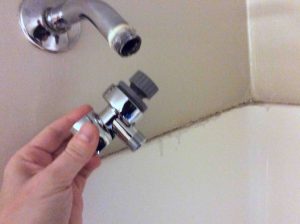
Position the Silver Holder
On this Waterpik shower head, we find a large nut at the back of the silver holder. This locks the holder in place once you’ve positioned it. Position and lock the head in the desired spot as follows:
Loosen Shower Holder Lock Nut
To twist the holder around, unscrew the gray lock nut. Loosen it just enough to unlock the holder from the ball joint. But do not completely loosen this nut, as the assembly might come apart and drop out internal parts.
Position the Hand Held Shower Holder to Continue with How to Install Hand Held Shower Head
With the holder unlocked, position it as you wish. For most shower head installations, plum the hand held unit. That is, place the holder so that the head and hose are vertical when seated in that holder. This helps assure that the shower head won’t fall out. It further assures that the hose will not kink while hanging. In our setup, the shower head ended up quite close to the ceiling. So we had to bend the holder forward a bit for adequate clearance. This introduced some light bending at both ends of the hose, but not enough to worry over.
Finger Tighten the Shower Holder Lock Nut
Once you positioned the holder on the ball joint, lock this joint in place. Do that by hand tightening the gray locking nut. Further, if you do not plan on re positioning this joint ever, then tighten an extra quarter turn. Use an adjustable wrench for this. But be careful not to mar the finished surfaces of the holder. However, do this only if absolutely necessary. Again, over tightening these plastic joints can permanently damage them. Just a little force goes a very long way with plastic threads.
Connect Source End of Hand Shower Hose to Holder Bracket
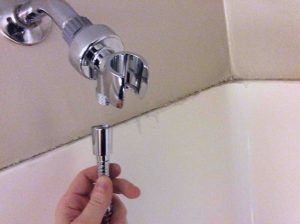
Observe Shower Hose Polarity, If Any
Some shower hoses need a specific hose end for the shower head. Then the other end goes on the source pipe. In these cases, they usually label the ends.
Only Hand Tighten all Shower Joints !
Now many hose ends, the holder threads, and the ball joint are likely a softer plastic. So avoid using wrenches or pliers to tighten this joint. The plastic is delicate and could easily break. But leakage still might occur here after hand tightening. In that event, try the sealing tape or pipe joint compound to stop if. However, if none of these works, then the holder piece is likely defective. So return the shower head to the store for replacement.
Attach Hand Held Shower Head to Hose to Continue with How to Install Hand Held Shower

Avoid Scratching Hose Finishes
Chrome-finished plastic scratches and mars with very little force. So use only your hands to secure these fittings to prolong finish life. But you still may need an adjustable wrench or vice grips. If so, then wrap fittings with an old dish rag before you start. Then, set the wrench jaws around that. This lowers chances of scratching.
Tighten All Joints Just Enough to Seal
Sometimes even hefty elbow grease can break these joints. But you need little force to make a good seal.
Test Shower Head Installation
Below is our Waterpik massaging shower head after installation, and appears to be functioning properly. No leaks found. But don’t rush to conclude that the installation is over just yet. Run the shower through a few paces as follows, to make sure leaks do not show up.
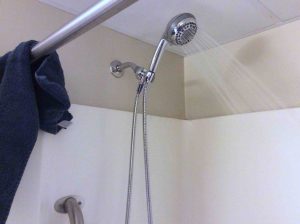
Test All Spray Settings to Continue with How to Install Hand Held Shower
Our Waterpik has eight different spray settings. Adjust to each of these, while water fully ON to make sure the settings lever moves easily. Also, different sprays place differing back pressures on the hose and fittings. Particularly for the most constrictive settings, check that no leaking occurs.
Quickly Turn Water On and Off Several Times
This not only stresses the joints and hose. But it also helps to seat the rubber sealing washers into their final positions.
Run Both All-Hot and All-Cold Water Through Shower
Run with all hot water first for a minute or so. Look for leaks. Then, run at cold for a minute or so. Again, watch for leaks.
Watch for Leaks, for Several Days
For the first week or so, keep an eye out for leaks at any of the joints. Chances are that if no leaks in the first week, then they’ll probably never leak.
This hand held shower head project is complete. Enjoy, and by all means, stay clean.
Related Posts to How to Install Hand Held Shower Head
- Waterpik Power Spray Plus Shower Head NSP-853 Review
- Danze Brass Interlock Shower Hose D469020 Review
Suggested Reading
- Top Load vs Front Load Washers Pros Cons
- Electric Heat Pros and Cons, Advantages, Disadvantages
- Front Loader Washing Machine Pros and Cons
- Tide Washing Machine Cleaner Review for HE
- Installing a New WiFi Router, How To
- Lysol Power Foam Bathroom Cleaner Review
References for How to Install Hand Held Shower
Revision History
- 2019-03-21: Shortened sentences, removed passive voice, and improved keyword targeting.
- 2019-02-08: Added key phrase targeting.
- 2015-12-14: Added more appropriate tags.
- 2015-09-27: Added appropriate tags.
- 2015-01-11: Originally published this piece.
